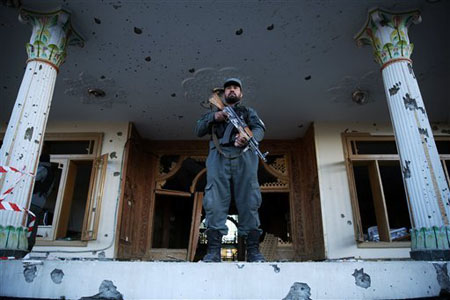By Sayed Salahuddin
KABUL — A group of Taliban insurgents, including two suicide bombers, stormed an office of the election commission in the Afghan capital Tuesday, killing six people, around the same time that two suicide bombers killed six members of the Afghan security forces in an eastern province.
In a third attack, a suicide bomber detonated an explosives-laden vest during an athletic competition, killing five people.
The attacks come less than two weeks before a crucial presidential vote that the militants have threatened to derail.
Seven Taliban fighters attacked a building in southwestern Kabul used by the Independent Election Commission of Afghanistan. Workers were trapped inside for several hours, according to the deputy interior minister, Ayoub Salangi.
“We had only two police officers who lost their lives in the initial explosion caused by one of the suicide bombers,” Salangi said over the phone from the scene after the attack.
Sediq Seddiqi, a spokesman for the Interior Ministry, said two civilians, an official of the election commission and a candidate for the provincial council also were killed in the attack.
Salangi said the employees trapped inside were freed safely. Security forces sealed off various roads leading to the building.
In Konar province, two suicide bombers killed at least six members of the Afghan security forces who were waiting in line at the New Kabul Bank branch to receive their salaries, the provincial governor, Shuja ul-Mulk Jalala, said by phone.

An Afghan policeman stands guard in front of an Independent Elections Commission (IEC) building after a gun battle between security forces and insurgents in Kabul, Afghanistan, Tuesday, March 25, 2014. Gunmen stormed into the building, trapping dozens of employees inside and killing four people. (Photo: Massoud Hossaini/AP)
“Although it was a big tragedy due to the loss of our security forces, we were lucky that there were not more casualties, given that the two bombers blew themselves up inside the bank,” he said.
The attackers fought for nearly two hours with bank guards and security forces who were sent to the site, the governor added.
Separately Tuesday, a suicide bomber struck near a group of people playing a polo-type sport called buzkashi. The attack occurred in the northern province of Kunduz, an official said.
Five people were killed, the official said, and the target appeared to have been a former mujahideen commander, who survived.
The attacks underscore the danger in the days leading up to the April 5 presidential and provincial council elections, as well as the Taliban’s apparent resources. Some worry that the attacks could deter voters from participating in the first peaceful transfer of power in modern Afghan history.
The Taliban has threatened to target any person or event linked to the vote and ordered people not to participate in the “sham elections,” saying in a statement that voters risk violent consequences. The group asserted responsibility for the Kabul and Konar attacks Tuesday.
A spokesman for the National Directorate of Security, Lutfullah Mashal, said Tuesday that the Taliban and two new militant groups were planning to hit “soft targets.” Mashal added that Afghan security forces are well prepared to prevent attacks against both “soft and hard targets,” referring to unfortified locations occupied mostly by civilians as well as sites defended by security forces.
In the past 10 days, dozens of people, including police officers and four foreigners, have been killed in militant attacks. The foreigners, including an election observer from Paraguay, were fatally shot in Kabul’s luxury Serena Hotel last week. At least five Afghans also lost their lives in that attack.
Four teenage gunmen managed to sneak six small pistols and scores of bullets in their shoes past screening machines and body searches, according to Afghan officials.
The Taliban asserted responsibility for the hotel attack, saying the men were suicide bombers and were equipped with grenades as well as rockets. The group said one of the attackers blew up the gate of the hotel, which is near the presidential palace.
At a news conference Tuesday, Mashal rejected the Taliban assertion, saying that there was no blast and that the attackers had nothing on them except for the small pistols.
Mashal accused hotel guards, who are not part of the government’s security apparatus, of failing to detect the attackers’ weapons and of rushing to a bunker instead of responding to the gunfire.
He also blamed neighboring Pakistan’s main spy agency for the attack. Most of the hotel staff are Pakistanis, Mashal said. A Pakistani diplomat had recently filmed the hotel, drawing suspicion of officials there, and his gym membership had expired a day before the attack, Mashal added.
“Another reason why we say Pakistan was involved is that on average five or six Pakistanis were coming for supper, but none came on the night of the attack,” he said.
Afghanistan has long accused Pakistan of providing sanctuary, arms and training to the resurgent Taliban, which had been toppled by U.S.-backed Afghan forces in 2001. The Pakistani government has denied this.



